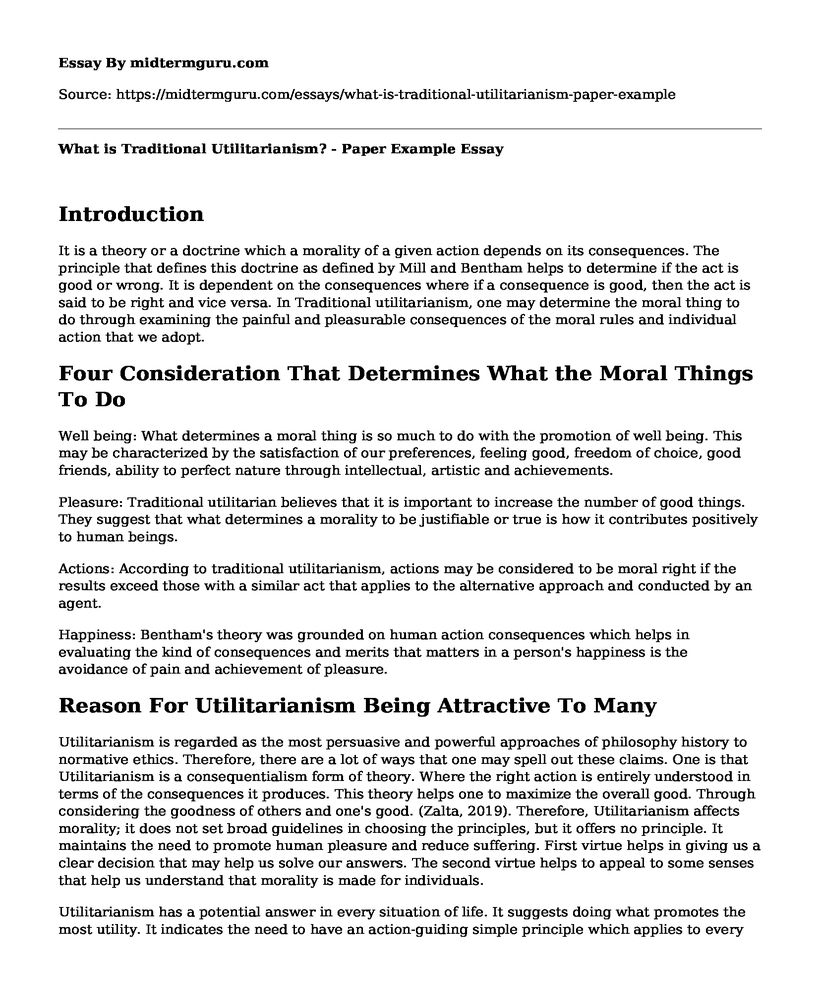Introduction
It is a theory or a doctrine which a morality of a given action depends on its consequences. The principle that defines this doctrine as defined by Mill and Bentham helps to determine if the act is good or wrong. It is dependent on the consequences where if a consequence is good, then the act is said to be right and vice versa. In Traditional utilitarianism, one may determine the moral thing to do through examining the painful and pleasurable consequences of the moral rules and individual action that we adopt.
Four Consideration That Determines What the Moral Things To Do
Well being: What determines a moral thing is so much to do with the promotion of well being. This may be characterized by the satisfaction of our preferences, feeling good, freedom of choice, good friends, ability to perfect nature through intellectual, artistic and achievements.
Pleasure: Traditional utilitarian believes that it is important to increase the number of good things. They suggest that what determines a morality to be justifiable or true is how it contributes positively to human beings.
Actions: According to traditional utilitarianism, actions may be considered to be moral right if the results exceed those with a similar act that applies to the alternative approach and conducted by an agent.
Happiness: Bentham's theory was grounded on human action consequences which helps in evaluating the kind of consequences and merits that matters in a person's happiness is the avoidance of pain and achievement of pleasure.
Reason For Utilitarianism Being Attractive To Many
Utilitarianism is regarded as the most persuasive and powerful approaches of philosophy history to normative ethics. Therefore, there are a lot of ways that one may spell out these claims. One is that Utilitarianism is a consequentialism form of theory. Where the right action is entirely understood in terms of the consequences it produces. This theory helps one to maximize the overall good. Through considering the goodness of others and one's good. (Zalta, 2019). Therefore, Utilitarianism affects morality; it does not set broad guidelines in choosing the principles, but it offers no principle. It maintains the need to promote human pleasure and reduce suffering. First virtue helps in giving us a clear decision that may help us solve our answers. The second virtue helps to appeal to some senses that help us understand that morality is made for individuals.
Utilitarianism has a potential answer in every situation of life. It suggests doing what promotes the most utility. It indicates the need to have an action-guiding simple principle which applies to every situation.
Utilitarianism helps in addressing the posterity problem. This includes what we ought to preserve for the betterment of future human generation. Utilitarian's overriding duty involves maximizing happiness. Although future people's quality of life promises to be positive, every individual must continue to produce a human being, human existence and ensure that their quality of life is high.
Ecological Ethics
Ecological Ethics is a discipline which studies human beings moral relationship and moral status and value of the environment and the nonhuman contents. It can also be defined as a field of ethics that concern the ethical relationship of the natural environment with human beings. This is the only ethic that values nonhuman and human nature. It recognizes that every person is a part of life and needs the rest vastly more and that there exists an ethical dimension to our every relationship. This ethic encourages ways of acting and living which may allow nonhuman and human nature to flourish. Environmental ethics outlines moral obligations in addressing questions such as what duties human beings have concerning the environment.
How Utilitarianism Support Ecological Ethics
Ecological ethics surrounds people and world with an ethical relationship. Therefore there ought to be ethical dilemmas that individual's face that includes conflicts between technological growth and constant strive for a country's sustainability economic growth and in stabilizing the economy for human species. Moreover, there are motivational issues that address saving the environment for a better future or saving it because it is the right thing to do. However, Utilitarianism theory insists that where actions are wrong or right depends on attempts of outcome to tackle issues that surround environmental ethics. It can be argued that utilitarianism has a key role to play in exploring the natural world, where the majority is considered than consequences. The utilitarian system of maximizing pleasure is beneficial in this ecological ethics; this is because the action may be considering a wide scope of individuals. An example If the government may follow Bethan utilitarianism approach in deciding to plant trees in tackling the carbon dioxide issue. Under the utility principle, the government would consider the pleasure of the majority and also weigh to the long term eff...
Cite this page
What is Traditional Utilitarianism? - Paper Example. (2022, Sep 12). Retrieved from https://midtermguru.com/essays/what-is-traditional-utilitarianism-paper-example
If you are the original author of this essay and no longer wish to have it published on the midtermguru.com website, please click below to request its removal:
- Essay on Social Ethics in Action
- Problem Identification and Background in Social Framework - Essay Sample
- Paper Example on Socrates Trial
- Essay Sample on Three Unanswered Questions about Faith, Morals, and Ethics
- Revised Code of Ethics: Benefits for Professional Accountants in the US - Research Paper
- Annotated Bibliography on Plato and Aristotle Philosophy
- Essay Sample on Ecclesial Organization







